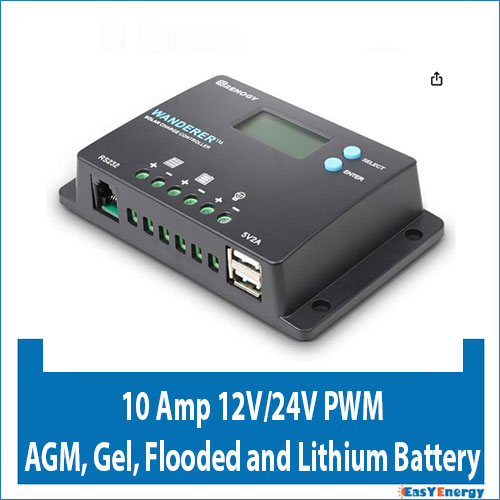Best Pwm Solar Charge Controller
The best PWM solar charge controller is the Renogy Wanderer 10 Amp 12V/24V PWM Negative Ground Solar Charge Controller. It offers reliable battery protection and is versatile for different solar power systems.
Negative Ground Solar Charge Controller
Selecting the right PWM solar charge controller is crucial for the efficiency and longevity of your solar energy setup. The Renogy Wanderer excels with its easy-to-use interface and compatibility with multiple battery types, including sealed, gel, and flooded lead-acid batteries.
Its negative grounding ensures safety, especially in vehicle-mounted systems where a positive ground could pose a risk. With its smart 4-stage PWM charging (Bulk, Boost, Float, and Equalization), the Renogy Wanderer optimizes battery performance and extends its lifespan.
With a compact design and informative LED indicators, it simplifies system management for both novice and experienced solar enthusiasts. This controller strikes an excellent balance between quality features and affordability, making it a top choice for a variety of off-grid applications.
Key Features To Consider
Choosing the best PWM solar charge controller is crucial for solar power systems. Maximum input voltage and current specifications are essential to match solar panels with the controller. The controller must handle the panel’s voltage and current without issues.
Load output and protection features safeguard connected devices. Look for controllers with overload protection, short circuit protection, and overcharge protection. These features ensure safety and longevity of the system components.
Battery compatibility is another key factor. The controller should suit the battery type used, like AGM, lead-acid, or lithium. Charging algorithms adapt to battery needs, enhancing charge efficiency and life.
Benefits Of Using The PWP Solar Charge Controller
Efficient Battery Charging ensures your devices get the power they need quickly. This keeps your system running smoothly and reliably.
Enhanced Battery Lifespan means you won’t need to replace batteries often. This saves you money and reduces waste over time.
Using a top PWM solar charge controller provides Overcharge and Overload Protection. This safety feature prevents damage to your battery, extending its life and maintaining performance.
Top Brands And Models
Brand A: Model X stands out with its efficient energy conversion. Its durability ensures long-lasting performance. Users praise its user-friendly interface.
Brand B: Model Y offers advanced features such as MPPT technology. This model is known for its reliable battery protection.
Brand C: Model Z shines with its compact design. It is perfect for small setups. The model also provides excellent value for money.
Installation And Maintenance Tips
Ensuring your PWM solar charge controller is correctly wired is crucial. Always double-check connections for firmness and accuracy. Use the right gauge of wires to prevent overheating and potential damage. It’s best to follow the manufacturer’s manual for optimal performance.
Regular maintenance keeps your controller working well. Clean dust and debris off your unit to avoid overheating. Check the terminals for any signs of corrosion and clean them if necessary. A clean controller ensures maximum efficiency and longevity. Scheduling inspections every few months is a good practice for system health.
Comparison With Other Charge Controllers
PWM (Pulse Width Modulation) Solar Charge Controllers are popular in small-scale solar applications. Their simplicity and affordability make them attractive. Contrastingly, MPPT (Maximum Power Point Tracking) controllers excel in efficiency.
PWM controllers link solar panels to batteries at a lower voltage. This process leads to energy loss when the panel’s voltage is higher than the battery’s. MPPT controllers, on the other hand, convert excess voltage into amperage. This feature reduces power loss and improves charge efficiency.
The advantages of PWM controllers include lower cost and ease of use. But they have limitations too. They are less efficient than MPPT controllers, especially in varied temperature conditions or when the solar array voltage is significantly higher than the battery voltage.
Case Studies And Real-world Applications
Residential solar power systems often integrate the best PWM solar charge controllers for efficiency. These devices regulate the energy flow, ensuring batteries charge safely. Households benefit from consistent electricity, even in remote areas. This sustainability is key for eco-friendly living.
Off-grid solar installations are gaining popularity, especially in locations without stable power grids. The PWM solar charge controllers play a vital role. They manage power from solar panels to batteries without grid electricity. Such setups are essential for cabins, RVs, and boats.
Frequently Asked Questions
Are Pwm Solar Charge Controllers Any Good?
Yes, PWM solar charge controllers are effective. They regulate battery charging by reducing the current gradually, which enhances battery life and efficiency. They’re also cost-effective and simple to install, making them a popular choice for small to medium solar systems.
What Is The Best Brand Of Solar Charge Controller?
The best brand for a solar charge controller varies based on individual needs, but OutBack Power, MidNite Solar, and Victron Energy are highly regarded for their reliability and performance.
How Do I Choose A Pwm Solar Charge Controller?
To choose a PWM solar charge controller, match the controller’s voltage to your battery bank’s voltage. Ensure the controller can handle your solar array’s current. Consider controllers with protective features, like overcharge protection. Opt for models with easy-to-read displays and necessary certifications.
What Are The Disadvantages Of Pwm Solar Charge Controller?
PWM solar charge controllers are less efficient than MPPT controllers, especially in varied weather conditions. They can’t maximize the potential energy from solar panels. PWM controllers also limit the solar system’s scalability, making it challenging to expand the system later.
Conclusion
Selecting the right PWM solar charge controller can significantly enhance your solar system’s efficiency. Remember to prioritize compatibility, durability, and user-friendly features. By choosing wisely, you ensure a sustainable and reliable energy solution. Embrace the power of the sun with the best PWM controller for your needs.

